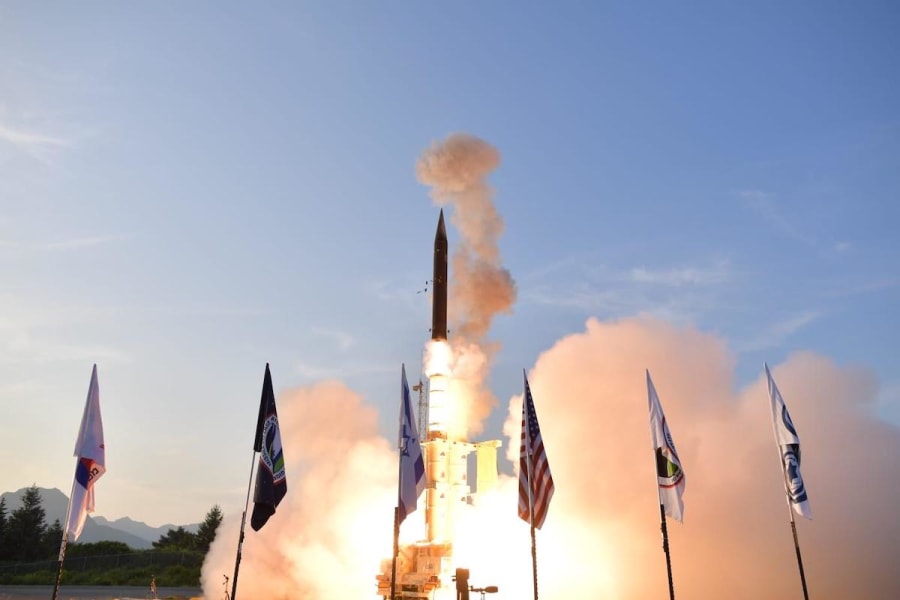Israeli Arrow 3 anti-ballistic missile system test declared successful
Defense Minister Benny Gantz said “with every step forward, with every development, we equip the State of Israel with the capabilities to defend itself against developing threats”

Israel’s Defense Ministry confirmed that the Jewish state’s Arrow 3 anti-ballistic missile system had successfully intercepted a target simulating an incoming Iranian missile on Tuesday.
The test was coordinated between the Israel Aerospace Industries and the Israeli Air Force.
Moshe Patel, head of the Israeli Defense Ministry’s Missile Defense Organization stressed the importance of the latest Arrow 3 anti-missile test.
“We have made a breakthrough in every part of the system, in the detection arrays, in the launches, even in the interceptors themselves, so that they match the threats that are expected in the region. There were highly, highly significant technological breakthroughs here that were assessed and can be used by the air force in its operational systems immediately,” Patel told the media on Tuesday.
The Israel Defense Forces Chief Lt. General Aviv Kochavi said the Arrow 3 test constituted an important component in the Jewish state’s overall defense capabilities in the volatile Middle East.
“The IDF and Israel’s defense establishment see great importance in constantly upgrading and improving our air defense capabilities. The test conducted this morning is another element in our ability to respond to developing threats in the region, and is a part of the implementation of the IDF's multi-year plan,” declared Kochavi.
Israel’s Defense Minister Benny Gantz praised the successful Arrow test and stressed that “with every step forward, with every development, we equip the State of Israel with the capabilities to defend itself against developing threats. Our systems provide Israel with the freedom to maneuver strategically.”
The Arrow 3 is the world’s first operational advanced long-range anti-ballistic missile system with a flight range of 1,500 miles (2,400 kilometers). It is designed to intercept enemy ballistic missiles at the earliest possible stage while they are still located outside the Earth’s atmosphere. The purpose of this rapid response system is to neutralize conventional and unconventional warheads as close to their original launch sites as possible.
The Arrow system was jointly developed and funded by Israel and the United States as a strategic anti-missile defense system to counter the growing missile threat from Iran and other regimes with expanding missile system programs.
Over the years, Iran has amassed the largest missile arsenal in the Middle East. Tehran is capable of hitting any target in the Middle East and its longest-range missiles are believed to be capable of reaching parts of Central Europe, while it hopes to develope intercontinental missiles that could eventually reach the American mainland. Consequently, Western military strategists view Israel as the Western world’s first line of defense against the growing Iranian missile threat.
The origin of the Jewish state’s advanced anti-missile systems can be traced to the First Gulf War in the early 1990s when the U.S.-made Patriot anti-missile system failed to intercept some 39 Scud missiles fired by Saddam Hussein’s Iraq against the densely populated region of Tel Aviv in central Israel. Miraculously, hardly any Israelis died but the traumatic event pushed Israeli military planners to focus on developing an indigenous Israeli anti-missile defense system that would protect its civilians from the growing threat of incoming enemy missiles.
Israeli military planners are reportedly revisiting a potential military strike option against Iran’s nuclear sites if diplomacy fails to prevent the ayatollah regime from acquiring a nuclear bomb. While many military experts believe that Israel’s military is capable of significantly damaging the Iranian nuclear program, Israeli officials are at the same time convinced that Iran and its terrorist proxy Hezbollah in Lebanon would respond harshly with a considerable amount of missiles fired at Israel. Thus, the Jewish state knows it must develop a potential strike option against the Iranian nuclear program that would include a defensive anti-missile strategy to thwart Iranian and Hezbollah missiles.

The All Israel News Staff is a team of journalists in Israel.














